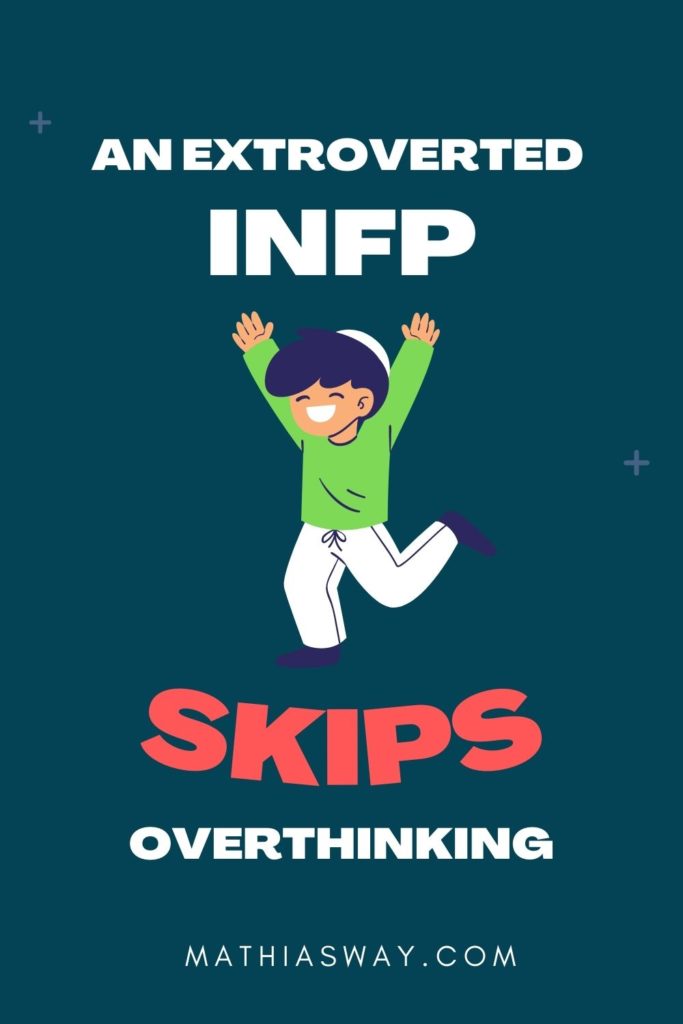INFPs may be introverted, but that doesn’t mean we don’t know how to have fun!
Last July, I attended a birthday party with my friends.
It had been over a year since I last saw the gang, but the bond remains solid. My friends were INFJ, ENFJ, ISTJ, and ISFJ, and of course, I’m an INFP. We all had a great time catching up and laughing together. And that night, I was the loud host asking hot seat questions.
I asked questions like, “Ter, have you ever been heartbroken?” “Jean, have you talked about weddings with your partner already?” and “Abbie, how will you deal with an upcoming long-distance relationship?”
I know, I know. I’m like the aunt everyone avoids during a reunion.
Because I was so eager, my ISTJ friend, with all her sassiness, told me, “Why the heck do you have so many follow-up questions!”
We chuckled. But hah! No one’s exempted from me that night.
So is it possible for an INFP to become outgoing, extroverted, and be the one who initiates? We sure do!
But here’s a key factor why I was so extroverted at that time:
With real friends, INFP’s extroverted traits come naturally.
INFPs Appear Extroverted When They Feel Safe
Here’s something I’m sure of — INFPs always have a lot in mind, especially when they’re in a new environment. With strangers, INFP minds keep their guards up and are guilty of doing these two circumstances.
They:
- obsess over the questions, “What would they think of me?” and “How should I act?”
- silently evaluate strangers instead of getting to know them.
In all fairness, INFPs have a knack for judging a person’s values. Based on what they feel, INFPs would either engage or repel.
They don’t trust easily, which makes friendships with them hard and slow to develop.
However, once an INFP trusts you, their wit, weirdness, and extroversion will start to show.
With no fear of being judged, INFPs could hold no brakes and share whatever’s in their minds.
Traits of An Outgoing INFP Once They’re Comfortable With People
Now, if we’re describing outgoing INFPs, here are the traits and characters you would usually see in them:
- Says what immediately comes to mind.
- Huge gigglers and overzealous
- Always initiate questions out of curiosity.
- Confident and in the moment.
- People are drawn to their vibrant energy and optimistic outlook.
- Your closest friends probably see you as an extroverted goofball.
Do these traits hit home to you? If yes, then you probably have an idea of what it feels like to be outgoing and extroverted.
But let’s continue further.
How to Be An Outgoing INFP?
First, I’d like to say there’s nothing wrong with being a quiet INFP. It’s OK to be yourself. I know an INFP who chooses to be alone rather than engage in shallow friendships because it’s exhausting to fake your identity.
But we also know that in today’s society, extrovert ideals often get an upper hand. Whatever the reason is for desiring a more extroverted demeanor, here are some tips to gradually turn you into a more outgoing INFP:
1. Don’t judge people too soon.
I hope this gets through, loud and clear: DON’T JUDGE TOO SOON.
Many INFPs probably won’t admit that they judge people. But they do. We always do!
With our introverted Feeling (Fi) function, evaluating the world against our values, standards, and beliefs is our default perspective of the world.
INFPs judge how people walk, how they talk, the clingy way this girl approaches people, or how this “cool kid” is so full of himself.
This INFP trait makes us selective with who to trust.
We see someone who doesn’t meet our standards, and bam, we write them off.
However, let me tell you this. Those feelings and first impressions aren’t always right. At times, we may cringe and avoid someone without realizing they are selfless beings we can rely on in times of trouble.
Being surrounded by sensing types, I realized that an opposing personality to mine isn’t inherently evil like what my introverted feeling (Fi) function subconsciously tells me.
It takes time to really get to know someone. Years!
An ISFJ was really getting to my nerves back then, but now, he’s the most selfless guy I’ve ever known in my life. I’ve actively avoided an ENFJ girl for over a year, only to end up being my best friend for 12 years and counting.
Sometimes, our trust issues are unnecessarily acting up.
In that case, you must refrain from judging strangers too soon. It results in an immediate disconnect.
Instead, give people time to show their true selves. Keep an open mind. Try to talk to them and don’t isolate yourself early on.
(Well, unless they’re bullies. Those are waving red flags.)
2. Join social groups, but don’t try too hard to make an impression.
INFPs have a hard time faking sincerity. The more you force yourself to be outgoing, the more you appear fake and awkward.
I remember reporting in front of the class and trying hard to look fun and engaging. But it turned into a disaster.
I was still in the middle of my introduction when my words came entangled, and I stuttered terribly. My energy went downhill, and that’s what I get for pretending to be someone else.
Don’t try too hard. You don’t have to be the center of attention to be outgoing. Just focus on enjoying yourself while interacting with the people around you.
Most importantly, be interested in them, rather than wanting them to be interested in you.
3. You shine when you accept your flaws.
Be confident in who you are.
Embrace all the facets of your personality and let your light shine bright. INFPs are the best when they mind their own business and do not deal with other people’s opinions.
And also, what is it that you’re hiding? Why do you romanticize keeping your problems a secret? Are you afraid to look vulnerable?
Come on. No one’s perfect, so get off of your pedestal. Truth is, the more you hide, the more you push people away.
On contrary, the more you accept your flaws, the less offended and sensitive you get. Thus, you can communicate with people better.
When you’re not afraid of your errors, the real you will start to show.
Be in the moment and enjoy your life rather than obsessing over your imperfections. That’s what being outgoing and extroverted is all about.
4. Find a tribe — those people you definitely trust!
Being outgoing doesn’t mean you have to be everyone’s best friend. This is the best tip I could give — surround yourself with people you feel safe with.
I’ve observed that INFPs find genuine happiness with people that effortlessly understand them — people who carry similar values — like INFJs and ENFJs. I’m lucky to find a cluster of NFs in my teenage years.
If you have noticed it, even when someone tries to approach you repeatedly, their friendliness doesn’t work on you unless you “click” with each other.
That “click” means you found common ground, and their values resonate with yours.
Laughs and giggles come naturally. Jokes are intuitive, and wit just flows. They would never feel the need to pretend or hide.
Now, the question is, how do you find those like-minded people?
One of my closest INFP friends in college shared his story about jumping from one circle to another. He said he was loyal to no group but joined activities with each class’s circles if he wanted to.
After his year-long search, he landed on our group — the most isolated and supposed “killjoys” who never joined the class’s unnecessary extracurriculars. But good for him, he found what he longed for — a group who cares about him. A group of INFP, INFJ, INTJ, and ISFP.
Go out there to find your tribe, but don’t be desperate for connection.
Don’t worry. Although it may take a while, you will attract the right people as long as you’re not isolating.
5. Don’t be wrapped in thoughts when in a conversation.

INFPs aren’t primarily shy. I’m definitely not. Just look at how our individualism shoots to the roof.
But dang, we’re so self-conscious. There’s a difference.
Shyness is a problem with self-esteem.
While with self-consciousness, we always see ourselves in the eyes of others. As a result, we become anxious, awkward, and struggle with mental blocks.
Instead of understanding a person, many INFPs would think ahead about what to ask next. They worry about giving a bland vibe. They don’t want to look weak or stupid.
But the more self-conscious they get, the more they mess up.
This is INFP’s way of killing their own vibe — overthinking what would happen next in a conversation instead of truly engaging with it.
If we’re not careful, we can miss important details and context making us look floaty and unsure of what we’re doing.
Don’t let your thoughts wrap you up.
Listen — really listen — to what others have to say. Be interested and try to understand the other person’s point of view.
The next time you’re in a conversation, try to resist the urge to jump into unnecessary thoughts.
Conclusion
Can INFPs be outgoing? They sure can be.
Many outgoing INFPs are introverts who learned to express their inner thoughts and feelings to the world.
You’re most extroverted when feeling genuine happiness.
So, again, don’t be afraid to put yourself out there! Go to parties or gatherings, and introduce yourself to new people.
With a conscious effort that turns into a habit, you can become the outgoing INFP you’ve always wanted to be!
-M.Mathias
Was this helpful? If you’d like to support my work, you can buy me a coffee. Thank you!

You may also like:
- INFP Friendship: 3 Reasons Why INFPs are Hard to Get to Know
- How Can INFP Stop Overthinking?
- 5 Exciting and Amusing Advantages of Being an INFP

